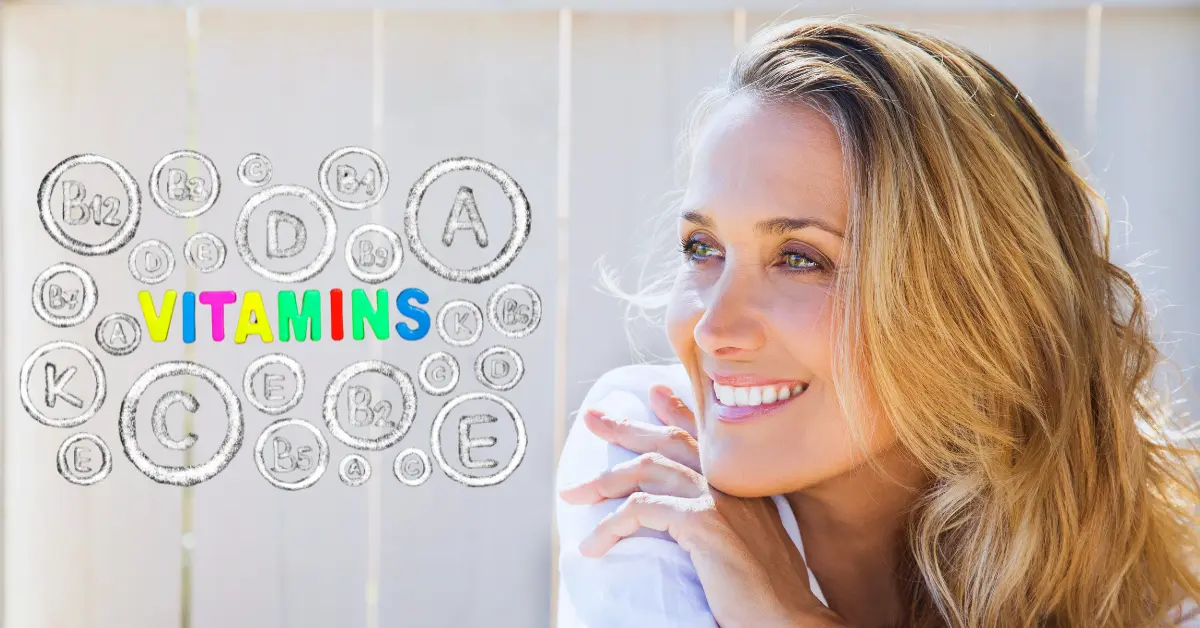Ladies, listen up! As we gracefully enter our 40s, it’s time to talk about the importance of vitamins in our daily lives. Our bodies go through significant changes during this transformative decade, and ensuring we get the right nutrients is crucial for maintaining optimal health and vitality. In this blog post, we’ll explore the best vitamins for women over 40, addressing common deficiencies and providing practical tips to keep you feeling your absolute best.
Key Takeaways
- Women over 40 have unique nutritional needs, and certain vitamins are essential for maintaining optimal health.
- Vitamin D, B12, Calcium, Magnesium, and Omega-3 fatty acids are among the most important vitamins for women in this age group.
- Incorporating these vitamins through a balanced diet, sunlight exposure, and supplementation (under medical supervision) can significantly impact overall well-being.
Vitamin D: The Sunshine Vitamin
Vitamin D, often called the “sunshine vitamin,” plays a vital role in women’s health after 40. This essential nutrient helps maintain strong bones, supports immune function, and may even contribute to a positive mood.
Unfortunately, many women over 40 are deficient in Vitamin D, especially those who spend most of their time indoors or live in regions with limited sunlight exposure (National Institutes of Health, 2021).
To boost your Vitamin D intake, spend some time outdoors in the sunlight (while wearing sunscreen, of course!), and incorporate Vitamin D-rich foods into your diet. Some excellent sources include fatty fish like salmon, egg yolks, and fortified dairy products. The recommended daily intake of Vitamin D for women over 40 is 600-800 IU.
Vitamin B12: The Energy Booster
Vitamin B12 is a powerhouse nutrient that plays a crucial role in energy production, nerve function, and red blood cell formation. As women age, the ability to absorb Vitamin B12 from food sources may decrease, making it essential to pay extra attention to this vital nutrient.
Signs of Vitamin B12 deficiency include fatigue, weakness, constipation, and even memory loss. To ensure you’re getting enough Vitamin B12, incorporate foods like lean meats, fish, eggs, and fortified cereals into your diet. If you follow a vegetarian or vegan lifestyle, consider taking a Vitamin B12 supplement under the guidance of your healthcare provider.
Calcium: The Bone Builder
Calcium is a mineral that is essential for maintaining strong bones and teeth, especially as women age. After 40, bone density begins to decline, increasing the risk of osteoporosis. Ensuring an adequate intake of Calcium can help slow down this process and keep your bones healthy and strong.
The best sources of Calcium include dairy products like milk, cheese, and yogurt, as well as leafy green vegetables, almonds, and fortified plant-based milks. The recommended daily intake of Calcium for women over 40 is 1000-1200 mg.
Magnesium: The Relaxation Mineral
Magnesium is a mineral that plays a vital role in over 300 enzymatic reactions in the body, including energy production, muscle and nerve function, and bone health. It also helps regulate mood and promotes relaxation, making it an essential nutrient for women over 40 who often juggle multiple responsibilities and stressors.
Signs of Magnesium deficiency include muscle cramps, fatigue, anxiety, and difficulty sleeping. To boost your Magnesium intake, include foods like leafy green vegetables, nuts, seeds, whole grains, and dark chocolate in your diet (Office of Dietary Supplements, 2021). Taking a relaxing Epsom salt bath can also help increase Magnesium levels through skin absorption.
Omega-3 Fatty Acids: The Brain and Heart Protectors
Omega-3 fatty acids are essential fats that play a crucial role in brain function, heart health, and reducing inflammation in the body. As women age, the risk of heart disease and cognitive decline increases, making Omega-3 fatty acids a vital nutrient for women over 40.
The best sources of Omega-3 fatty acids include fatty fish like salmon, sardines, and mackerel, as well as plant-based sources like flaxseeds, chia seeds, and walnuts. The recommended daily intake of Omega-3 fatty acids for women over 40 is 1.1 grams.
Conclusion
Women over 40 have unique nutritional needs, and incorporating essential vitamins like Vitamin D, B12, Calcium, Magnesium, and Omega-3 fatty acids into your daily routine can significantly impact your overall health and well-being. By focusing on a balanced diet rich in these nutrients, getting regular sunlight exposure, and considering supplementation under the guidance of a healthcare provider, you can unlock optimal health and vitality in your 40s and beyond.
Remember, every woman’s body is different, and it’s essential to consult with your healthcare provider for personalized recommendations based on your individual needs and medical history. By prioritizing your nutritional health and making informed choices, you can embrace this transformative decade with energy, resilience, and a renewed sense of self.
Frequently Asked Questions (FAQs)
While it’s possible to obtain many essential vitamins from a well-balanced diet, some women over 40 may benefit from supplements due to factors like dietary restrictions, absorption issues, or lifestyle habits. Consulting with a healthcare provider can help determine if supplements are necessary for your individual needs.
Taking vitamin supplements in the recommended doses is generally safe for most people. However, excessive intake of certain vitamins can lead to adverse effects. It’s essential to follow the recommended dosage guidelines and consult with a healthcare provider before starting any new supplement regimen.
If you have limited sun exposure, you can increase your Vitamin D intake by incorporating foods like fatty fish, egg yolks, and fortified dairy products into your diet. If you’re still deficient, your healthcare provider may recommend a Vitamin D supplement.
Some studies suggest that Vitamin E may help alleviate hot flashes and night sweats associated with menopause. Additionally, Calcium and Vitamin D are essential for maintaining bone health during and after menopause. Consult with your healthcare provider to determine if these vitamins may be beneficial for your specific menopausal symptoms.

